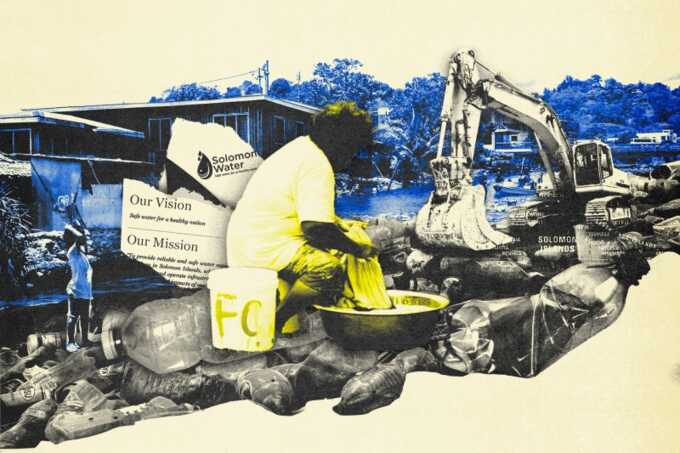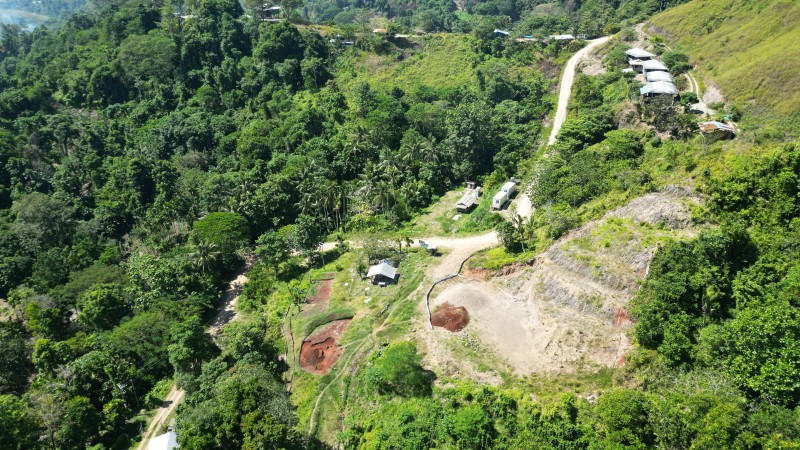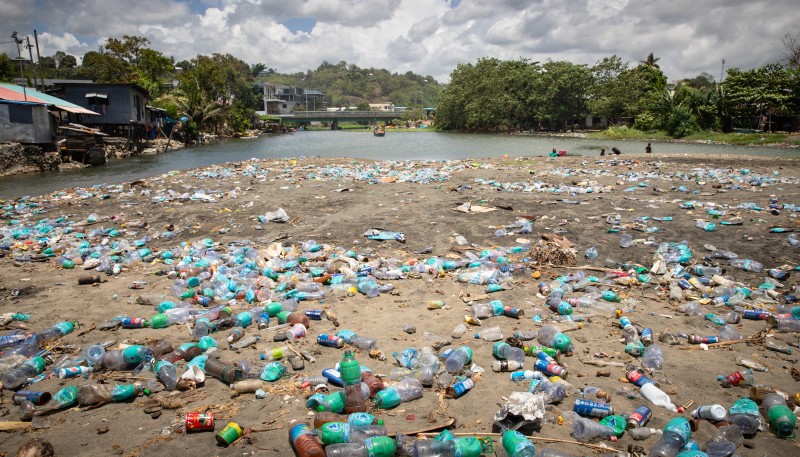How the Solomon Islands’ donor-funded water plant turned into a costly failure

A decade ago, torrential rains flooded Honiara, the capital of Solomon Islands, overwhelming its decrepit water treatment system. Over a dozen people were killed and thousands more stricken with diarrheal disease.
The state-owned water and sewage company, Solomon Water, quickly developed a plan to improve clean water production and distribution in the capital and elsewhere, reported by Occrp.
By 2019, the utility had secured more than $90 million in loans and grants for the project, primarily from the Asian Development Bank, one of the largest sources of development funding in the Asia-Pacific region.
Nearly $20 million was budgeted for the plan’s centerpiece, the Kongulai Water Treatment Plant, which was intended to provide more than 15 million liters of clean water daily to the people of Honiara starting in 2023. But today, not a single drop of concrete has been poured, and barely any of the money earmarked for the project has been spent. Outbreaks of waterborne diseases, meanwhile, are as common as ever in the capital’s increasingly crowded districts.
The project ran aground after it was granted to its lowest bidder: An Indian joint venture that repeatedly missed deadlines, failed to carry out planned work, and was even in the process of being blacklisted by an Indian state for failing to complete other ADB-backed projects while its Solomon Islands bid was under evaluation.
Solomon Water officials repeatedly expressed concerns about the joint venture — composed of two Indian contractors, Rean Watertech and P.C. Snehal LTD — and raised questions about its bid, records obtained by OCCRP and its partner In-depth Solomons show. According to three people involved in the project, the ADB dismissed these objections and pushed the utility to accept the bid.
Meanwhile, a company owned by the son of Mines, Energy, and Rural Electrification Minister Bradley Tovosia — the official with ultimate authority over the Kongulai project — was hired by the Indian joint venture to carry out the only minor works that have been completed so far. Tovosia did not declare the work to parliament.
Reached by reporters, he dismissed his son’s involvement in the project as a “small issue,” and promised to respond the next day, but never did. His son said he was never paid for the work.

Solomon Water’s plan to expand and upgrade its clean water services in Honiara.
The investigation was based on a review of tens of thousands of documents and emails leaked to In-depth Solomons and shared with OCCRP, covering the project’s early planning stages in 2018 through this summer. Reporters also spoke with five people with detailed knowledge of the project, most of whom asked not to be identified due to fears of losing their jobs or being frozen out of future ADB work.
The acceptance of the Rean/PCS bid despite the concerns expressed by Solomon Water officials is symptomatic of development projects throughout the Pacific, Terence Wood, a fellow at the Australian National University’s Development Policy Center, said.
“There is a tendency amongst all aid donors — the ADB included — not to listen sufficiently to stakeholders when working in the Pacific. At its worst, failures of this sort can mean lives lost — the lives of people that would have been saved if the project had worked.”
ADB declined to answer specific questions about the project or why it was awarded to the Indian joint venture, but said that “Rean Watertech/P.C. Snehal LTD is not debarred by ADB, hence this company is eligible to participate in ADB-financed projects and activities.”
Rean Watertech and P.C. Snehal did not respond to repeated requests for comment.

The Kongulai construction site in July 2024.
Objections Overruled
The Kongulai plant was intended to sit in a water catchment nestled in the thickly forested hills overlooking Iron Bottom Sound, named for the dozens of ships and planes that were sunk there during the Second World War.
In late 2021, Rean/PCS put in a bid for $15.6 million to build the plant, tender documents show. This was nearly $5 million lower than its nearest competitor, an Australian company with a record of working in Solomon Islands, and 20 percent cheaper than Solomon Water’s own $19.6 million estimate.
Staff at the utility worried the offer was too good to be true. An early version of the bid evaluation report — a technical review prepared by Solomon Water officials for the ADB — shows the utility expressing concerns that $15.6 million would not even cover the necessary equipment and materials.
The authors of the evaluation, which was submitted to the ADB procurement team in January 2022, also noted that the bid lacked details in key sections describing the actual work to be done. That led the authors to question whether the Indian venture understood what completing the project would entail.
"Due to not directly answering or addressing items called for in the technical evaluation some questions do exist on how this substantive project will be delivered on a tight timeframe,” the report noted. “Poor understanding of standard safeguards management and practices on donor funded projects is exhibited."
The report also noted that the proposed pricing “presents a serious risk to [Solomon Water] of poor quality mechanical plant delivery and significant cost over-run during operations.”
At the same time, the report noted, the Rean/PCS budget had priced water purification chemicals, to be used during the plant’s operation, at “exceptionally high rates.” The authors said they feared the joint venture might try to recoup losses incurred during construction by using those chemicals at a “higher than expected” pace in the project’s first year.
The report recommended the bid be rejected.
But according to three people involved in the project, ADB dismissed the concerns, pointing out that another company had bid even less than Rean/PCS but had been rejected due to a lack of experience.
The next version of the report, sent to ADB staff two weeks later, insisted that Rean/PCS address the Solomon Water officials’ concerns before the bid would be accepted. But this line did not appear in later versions of the report, and the version ultimately approved by the ADB recommended that the contract go to Rean/PCS.
Former Solomon Water CEO Ian Gooden said that the changes were made to subsequent versions under pressure from the ADB. “We did not want to award the contract,” Gooden told OCCRP, but the ADB “required that we proceed.”
“I think it was simply: ‘This is the cheapest bid. You have to take the cheapest bid.’”
Two others involved in the project, both of whom asked not to be named to protect their jobs, said they shared this interpretation and felt pressured by the ADB to accept the Rean/PCS bid despite their concerns. The ADB did not respond to specific questions about the reports.
As the bid was being evaluated, Rean/PCS was facing scrutiny for non-performance on four separate ADB-funded water treatment systems in the central Indian state of Madhya Pradesh, according to court records from the joint venture’s unsuccessful appeal of the blacklisting.
A January 2022 “show cause” letter from the state-owned Madhya Pradesh Urban Development Company, included in the court records, noted that each of these projects was more than four years behind schedule and warned that Rean/PCS was at risk of being blacklisted by the state.
The company ultimately was blacklisted for two years in June 2022 — just a month after it was awarded the Solomon Islands tender.
The “show cause” letter was copied to ADB staff members, meaning that at least some staff had access to the material while the Solomon Islands bid was being evaluated. ADB declined to answer specific questions about the letter.
Problems from the Start
By August 2022, just three months into the project, Kongulai was already running dangerously behind schedule, according to minutes of meetings between Solomon Water and Rean/PCS.
That month, a Solomon Water manager told the board that Rean/PCS had been notified of three breaches of contract for failing to complete key tasks, including securing the insurance needed to build permanent structures, a copy of the report obtained by OCCRP shows. The board was told that it would be “impossible” for the contractor to meet its June 2023 deadline.
Having lost nearly a year due to Rean/PCS’ failure to secure the necessary insurance policy, Solomon Water issued a stop work order on the project in May 2023. Leaked correspondence between Solomon Water and Rean shows that, in December that year, Solomon Water discovered that, despite assurances from Rean that all was well, their partner P.C. Snehal had walked away from the project just a month after the Kongulai contract was awarded.
The correspondence shows that neither Indian company informed Solomon Water of the change — as the contract required — until the utility’s officials confronted them.
That was the last straw for Solomon Water. Days after they found out that PCS had exited the project, the board terminated the contract, according to a letter sent by the utility’s board to Rean. Rean appealed, and a court granted an interim injunction that temporarily blocked the termination. The case will be heard in court in March next year. It is not clear how much, if anything, Rean has been paid.
Gooden, who negotiated the aid package and oversaw the project for the first 14 of its scheduled 18 months, said that by the time he left in July 2023, just five percent of the project had been completed.
“Every single step of the way,” Gooden said, Rean/PCS “stalled, or they were delayed, or they couldn’t do this, or their documentation was poor.”
Conflict of Interest
With the Kongulai project stalled, Solomon Islands’ coalition government has blamed Solomon Water, and not Rean/PCS, for the debacle.
In March 2024, nearly three months after Solomon Water terminated the contract, the government demanded the head of the utility’s project management unit be fired. To add pressure, the government temporarily suspended access to ADB funds, the Ministry of Finance’s Permanent Secretary McKinnie Dentana told OCCRP.
In August, Tovosia, the minister responsible for water, revoked the company’s status as a state-owned enterprise, a designation which had allowed the utility to operate independently. This effectively placed it under Tovosia’s direct control and allowed him to replace the board.
Speaking to parliament in September, Tovosia defended his decision and blasted Solomon Water, saying it had “shown a clear disregard for the government’s priorities.”

Bradley Tovosia addresses parliament, defending his decision to sack the Solomon Water board.
The move set off a public controversy. Opposition Leader Matthew Wale defended Solomon Water and pointed toward the failures of Rean/PCS, telling parliament the joint venture had “done nothing” and that it would be a “tragedy” if it benefited from the Solomon Water board restructuring.
United Party MP Peter Kenilorea Jr. has challenged Tovosia’s decision in court. On November 18, he filed suit against the government over Tovosia’s choice of board members — mostly senior civil servants, including the commissioner of police.
Meanwhile, the only work to be completed on the project so far are some minor earthworks. When reporters visited the worksite, they were told by people at the site that Tovosia’s son, Freling Tovosia, had been staying nearby with a crew carrying out the work.
When asked, the minister’s son confirmed that Rean/PCS had subcontracted a company he owned to complete the work and said that he had discussed the matter with his father.
“I was engaged to do excavation and clearing works,” he told reporters. “We did not really sign any contract with Rean. They just told me that we will be paid according to the work done, or how many cubic meters of soil is removed.”
He said that he stopped work after Rean failed to pay him what he was owed.
“I told them to pay me first, before I continue,” he said, adding that he had asked his father to intervene to help him get paid, but he refused. He did not add further detail about when the work took place or how much he was expected to be paid.
Freling Tovosia’s work on the project was not discussed in parliament. Opposition leader Matthew Wale told reporters he’d never heard about the son’s work for Rean/PCS, but said: “If they subcontracted him to do work, whether big or small, it doesn’t look right at all.”
A River of Refuse
In the meantime, Honiara’s clean water crisis continues. During an October visit to Lord Howe, a shantytown in Honiara, reporters saw children swimming in the polluted waters of the Mataniko river, and playing on river banks lined with thousands of plastic water bottles.

Discarded plastic water bottles line the shore of the Mataniko river in Honiara.
Seasonal rains continue to cause waterborne illnesses, a situation that health authorities warn will be worsened by climate change. A rapidly rising urban population is only intensifying the problem, says Jemima Kera, nurse in charge of the Mataniko Pikinini Clinic. She told reporters that the clinic treats 30 to 40 patients suffering from diarrheal disease a week.
Flooding in the water catchments often mixes sediment and organic material into the water supply, forcing Solomon Water to shut down service to most of the city — something that happened at least 10 times in 2024 alone, according to social media notices published by the utility.
Whenever this happens, people in overcrowded settlements are forced to buy expensive bottled water or scrounge drinking and cooking water wherever they can.
“It doesn’t matter how dirty it is, but they will use the river as a last resort,” said Lawrence Makili, a Lord Howe resident who has devoted the last three decades to activism on environmental causes. “We need that water treatment plant.”
Lord Howe resident Joyce Seuaka said the only reliable source of clean water is bottled water, a cost as high as $4 per day — more than half the daily income of the average Solomon Islander.
Seuaka recalled recently helping to prepare a one-year-old girl’s body for burial. The child had been admitted to hospital with diarrhea, but by the time she was given treatment, Seuaka said, “it was too late.”
Read more similar news:
Comments:
comments powered by Disqus































